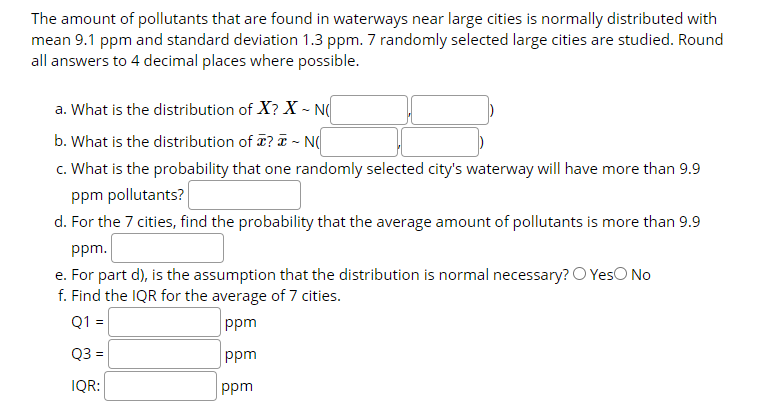a. What is the distribution of X? X - N( b. What is the distribution of ? ~ N c. What is the probability that one randomly selected city's waterway will have more than 9.9 ppm pollutants? d. For the 7 cities, find the probability that the average amount of pollutants is more than 9.9 ppm. e. For part d), is the assumption that the distribution is normal necessary? O YesO No f. Find the IQR for the average of 7 cities. Q1 = ppm Q3 = ppm IQR: ppm
a. What is the distribution of X? X - N( b. What is the distribution of ? ~ N c. What is the probability that one randomly selected city's waterway will have more than 9.9 ppm pollutants? d. For the 7 cities, find the probability that the average amount of pollutants is more than 9.9 ppm. e. For part d), is the assumption that the distribution is normal necessary? O YesO No f. Find the IQR for the average of 7 cities. Q1 = ppm Q3 = ppm IQR: ppm
Glencoe Algebra 1, Student Edition, 9780079039897, 0079039898, 2018
18th Edition
ISBN:9780079039897
Author:Carter
Publisher:Carter
Chapter10: Statistics
Section10.4: Distributions Of Data
Problem 19PFA
Related questions
Question

Transcribed Image Text:The amount of pollutants that are found in waterways near large cities is normally distributed with
mean 9.1 ppm and standard deviation 1.3 ppm. 7 randomly selected large cities are studied. Round
all answers to 4 decimal places where possible.
a. What is the distribution of X? X - N
b. What is the distribution of ? T - N(
c. What is the probability that one randomly selected city's waterway will have more than 9.9
ppm pollutants?
d. For the 7 cities, find the probability that the average amount of pollutants is more than 9.9
ppm.
e. For part d), is the assumption that the distribution is normal necessary? O YesO No
f. Find the IQR for the average of 7 cities.
Q1 =
ppm
Q3 =
ppm
IQR:
ppm
Expert Solution
This question has been solved!
Explore an expertly crafted, step-by-step solution for a thorough understanding of key concepts.
Step by step
Solved in 3 steps

Knowledge Booster
Learn more about
Need a deep-dive on the concept behind this application? Look no further. Learn more about this topic, statistics and related others by exploring similar questions and additional content below.Recommended textbooks for you

Glencoe Algebra 1, Student Edition, 9780079039897…
Algebra
ISBN:
9780079039897
Author:
Carter
Publisher:
McGraw Hill

Glencoe Algebra 1, Student Edition, 9780079039897…
Algebra
ISBN:
9780079039897
Author:
Carter
Publisher:
McGraw Hill